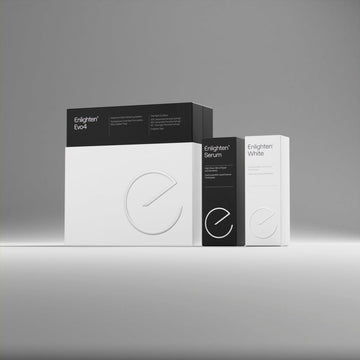Teeth Whitening for Sensitive Teeth – Everything You Need to Know

Sensitive teeth can be the bane of your life – and we know that pain while eating or drinking is difficult to handle. For some people, even brushing their teeth can cause them discomfort.
Fortunately, there are many ways to reduce sensitivity and alternative whitening treatments for people with sensitive teeth.
In this article, Enlighten's CEO and dentist, Sanjay Patel sheds light on everything we need to know about teeth whitening for sensitive teeth as well as combating the problem at home.
What Causes Sensitive Teeth?
If you think you’re alone when it comes to dealing with sensitive teeth, rest assured, you’re not.
Tooth sensitivity is a widespread issue that affects many people and causes immense discomfort during normal activities, like eating, drinking, and cleaning your teeth.
Some of the main causes of sensitive teeth include:
Worn Tooth Enamel: Tooth enamel — the hardest tissue in the human body — acts as a protective shield. Over time, habits like brushing too hard or consuming acidic foods can wear it down, exposing the sensitive dentin layer underneath. This layer contains microscopic tubules that lead directly to the tooth's nerve, making it sensitive when exposed to things that are too hot, cool or acidic.
Gum Recession: Gum recession is when the gum tissue pulls away from the tooth, which can happen when you brush too hard or allow too much tartar to build up over long periods. Habits like smoking can also cause gum disease where you can lose bone underneath your gums which then also causes gums to recede... This exposure of the root surfaces — which aren’t protected by a sturdy enamel — can lead to increased sensitivity. The roots contain nerves that react to temperature changes and certain foods.
Cavities: When decay penetrates the outer layers of a tooth, it can reach the dentin or even the pulp, where nerves and blood vessels are located. As a result, cavities can cause significant sensitivity and pain.
Teeth Grinding: It’s not uncommon for people to grind their teeth when they’re asleep or throughout the day. It may seem trivial, but this habit wears the enamel down over time. It exposes the delicate dentin layer underneath causing discomfort. Teeth grinding also increases the likelihood of microfractures in the enamel and increased sensitivity. So, it’s recommended to talk to your healthcare provider if you think you’re experiencing any of the symptoms of grinding.
Some Whitening Products: Some people experience increased sensitivity to whitening products, especially those containing peroxide. This sensitivity typically subsides once the treatment is stopped. However, using products formulated for sensitive teeth can help alleviate discomfort.
What Are the Different Types of Teeth Whitening?
Teeth whitening options come in several forms:
1. Professional whitening in a dental office: This is performed by a dentist and offers the quickest, most noticeable results, though it tends to be the costliest option.
2. Home whitening kits: These include products like strips, gels, and trays that you can use independently at home. While more budget-friendly than professional treatments, these options can generally take longer to achieve visible results.
3. DIY or natural approaches: Natural methods, like oil pulling, baking soda, or activated charcoal, are also plentiful in the market. However, these remedies are not strongly backed by evidence and could have potential side effects. So, exercise caution with any natural remedy found online.
How to Reduce Sensitivity during Teeth Whitening?
Teeth whitening can cause some irritation if done too regularly or even mid-session. It depends on how sensitive your teeth are.
Luckily, there are many reasons to limit sensitivity and reduce discomfort while having your teeth whitened or if you’re whitening your teeth at home.
These include:
1. Use desensitising toothpaste: Start using a desensitising toothpaste two weeks before your treatment, as it can help block nerve endings. Use the Enlighten Serum for 2 weeks before whitening and then throughout the whitening process.
2. Avoid hot or cold drinks: Once applied, stick to room-temperature drinks to prevent additional discomfort caused by extreme temperatures.
3. Follow product instructions carefully: Be sure to use the product as directed to avoid increasing sensitivity by overusing or leaving it on longer than recommended.
4. Consult your dentist: If you have sensitive teeth or a history of sensitivity with whitening treatments, speak to your dentist first. They can recommend alternative methods or tailor your approach to reduce discomfort.
Why choose Enlighten?
Need a quick, safe and reliable way to get your teeth looking their best and giving you the confidence you’ve always dreamed of?
Enlighten’s advanced teeth whitening systems and products are designed to deliver impressive results through cutting-edge, minimally non-invasive treatment!
If you need a professional dentist to help you get the results you crave, find the right dentist here.
For all things oral health — as well as up-to-date news on important developments in the dental space — why not read some of our guides?
FAQs
How Does Teeth Whitening Work?
Teeth whitening is a cosmetic dental procedure that uses whitening agents to eliminate stains and discolouration on the teeth.
The most commonly used agents — hydrogen peroxide and carbamide peroxide — penetrate the enamel to break down stains, resulting in a brighter, whiter smile.
Although agents are used to whiten teeth, you must still practice good oral hygiene to reap the best rewards of a whitening treatment and have a healthier mouth.
Can Teeth Whitening Cause Sensitivity?
Teeth whitening may lead to sensitivity — particularly for those who already experience it.
The whitening agents in these products can potentially irritate nerve endings in the teeth of some individuals, resulting in sensitivity.
While this is typically temporary and resolves on its own, in some instances, the sensitivity can be more intense and may persist for several days or even weeks.
› DIG DEEPER ‹
![]()
Learn more about the Enlighten Teeth Whitening System HERE.
And to find an Enlighten whitening expert near you, hit the link below.
FIND A DENTIST

Or if it’s mini smile makeovers you want to dig deeper into, then give it a click right HERE.
_________________________________________________________________________






